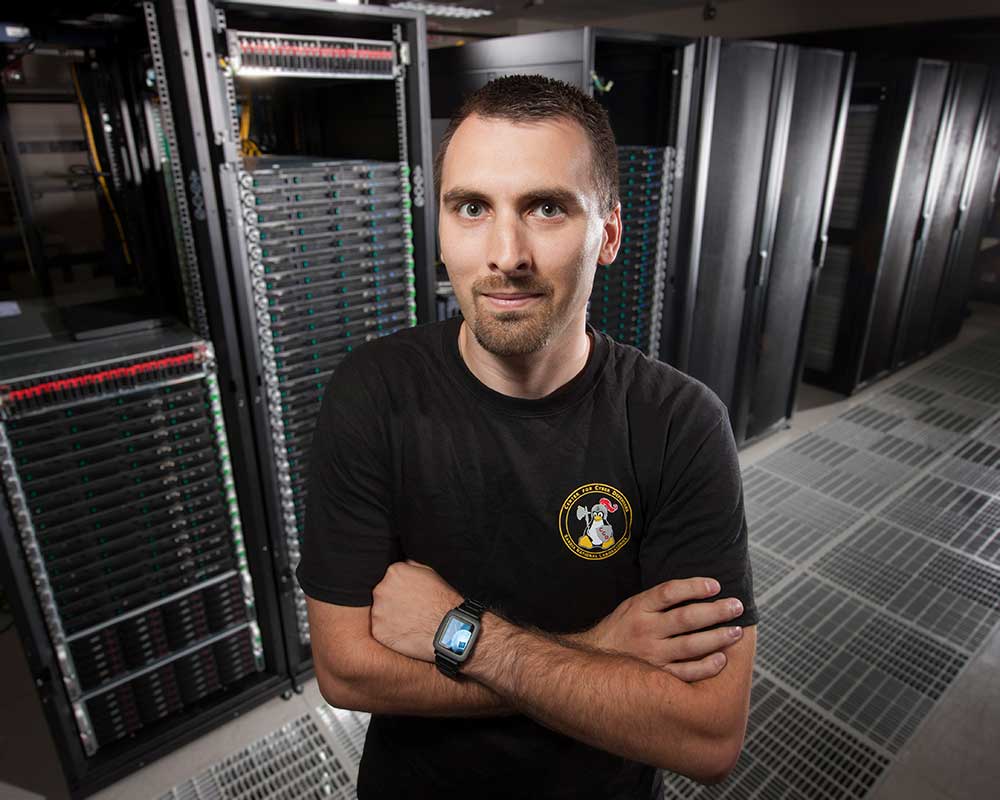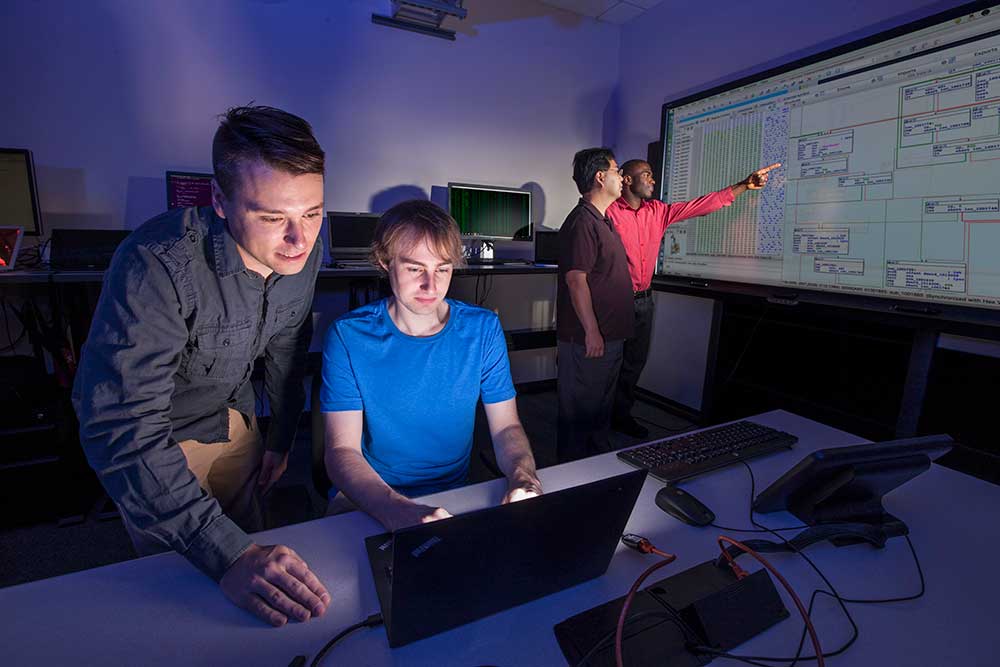
For more than a third of Sandia’s 75-year history, the Center for Cyber Defenders has cultivated new generations of cybersecurity experts who have brought ingenuity to defending the nation.
When the center was established in 1999 at Sandia California, the internet was less than a decade old and cybersecurity was in its infancy. In the quarter century since its founding, the interns fostered through the program have helped build, refine and secure the online ecosystem.
“It started very humbly with a handful of interns from Las Positas College (in Livermore),” said Steve Hurd, retired Sandian and former program lead for the center who joined the program in 2002. “It exploded from there. I think it went from eight or nine interns to 30 something interns in the matter of a couple of years.”
Cybersecurity was not yet widely seen as a viable career choice at the turn of the century. The Center for Cyber Defenders would be one of the ways that would change.
“We couldn’t find talent at that time,” Hurd continued. “We needed talent, so we grew our own.”
What a difference 25 years makes
Since its launch, more than 800 interns have worked in the center in New Mexico and California. Current center lead Steven Barker now manages its robust internship program, where undergraduate and graduate students come from all over the nation to learn with the experts.
“In general, our goal is not to teach interns how to do cybersecurity. We help them take what they were taught in their classes and learn how to apply it in a real environment,” Steven said.
Mentor Alex Marti said the interns get access to problems that aren’t classified but may lead to methods that solve other, more sensitive issues.
“We’ll talk with them and ask, ‘How would you start this?’” Alex said. “Seeing their thought process not only helps us view their ideas and see from their perspective, but also helps them think through the problem step by step. Exchanging new ideas back and forth helps the interns to overcome technical challenges as well as keep forward progress. The intern learns something new, helps us in our research and also brings us one step closer to our goal.”
Steven agrees that the interns add value to Sandia’s national security work.
“They’re fresh in school, they’re learning new things, and they have a lot of new ideas and perspectives that we may not have considered,” he said.
Real problems lead to innovative solutions
That commitment to immersion hasn’t changed as far as Hurd is concerned.
“It’s real world. They’re not just being assigned some random task that we don’t care about,” he said. “One constant has been that the projects we do are real-world projects. Some of them, as you might imagine, are pieces that are carved from a set of work that is either classified or sensitive. Generally, we try to find things that aren’t too terribly sensitive but are connected so that they can understand some of the context.”
While Center for Cyber Defenders staff can’t disclose project specifics, interns might be assigned to look into a ubiquitously used system, like videoconferencing or file transfer systems, and try to break it in any way they can think of or write initial code to automate reverse-engineering malware.
“We want to try to determine what the malware does so that we can either identify how it impacted us or be able to block it in the future,” Hurd said. “It’s an incredibly time-consuming task. The people who do it are rare as unicorns and extraordinarily expensive. With that initial intern work, our researchers, who are incredibly busy, could focus exclusively on tasks that require their expertise.”
He added that mentors also try to teach interns how to work in teams and communicate their work.
“That sort of differentiates the Center for Cyber Defenders,” Hurd said. “You’re being mentored by an experienced professional in the field, and that’s been a lot of what is the special sauce of the brand.”
One of us
That close mentorship was incredibly important to Steven and Alex when they were interns, and something they are actively continuing in their current leadership roles.
“We intentionally plan lots of opportunities for interns to get to know other staff members and learn about other projects that they’re not working directly with to build connections and give them a bigger picture of the work that is done at Sandia,” Steven said. “If I was having a problem, I could just ask a question and then I would immediately have two or three other interns right there helping me. Later, another intern would ask a question about something I was familiar with, and I could take a turn helping them.”
Alex recalled how those kinds of relationships built him up during his time as a CCD intern.
“Having a mentor close to you, leading and guiding you really helps to build confidence,” he explained. “I personally had a few ideas that the mentors I was working with thought were great and wanted to implement them into the project. Having an intern make meaningful contributions is the goal.”
It’s all in the culture
According to Sandia records, at least 200 of the more than 800 interns who passed through the program in the last 25 years were hired as full-time researchers — with 153 of them still employed today. That number is not only deeply gratifying to Steven, Alex and Hurd, it has provided the Labs with a cybersecurity workforce that is steeped in the evolution of the profession and in the culture of Sandia.
“One of the things about the culture that was the most important in my eyes was the openness of everybody,” Steven said of his internship experience. “You would hear, just in passing, that somebody worked on something cool. If you shot them an email and just asked to talk about it, nine times out of 10, they’d say absolutely. Everybody is so open and willing to talk about and share what they’re working on.”

“It wasn’t just the cool cybersecurity work we do here that made me want to stick around,” Alex said. “The culture, the people and the wonderful intern program played a big role in me going full time. I loved how everyone is so nice and willing to help and that stuck with me to this day. I consider Sandia to be the gold standard. Even if interns don’t end up working here, they at least can see what a good working environment that respects their employees looks like and judge what they want as they continue their professional career.”
According to Steven, Sandia’s culture has yielded an incredibly deep and well-trained cybersecurity workforce.
“A lot of our staff members, especially within the cybersecurity positions, have come in through the center program,” he said. “Instead of hiring blindly from a stack of 100 resumes, interns have almost like a trial period — a chance for these people to work with our staff members for them to get to know each other, make connections and see what Sandia is like. We also have a much better idea if they are somebody who would be a good fit long term as a Sandian.”
And that, Hurd said, has given the Labs an exceptional reputation.
“There’s absolutely no way that Sandia would be in the position it is now in terms of cybersecurity had it not been for the number of people we’ve brought in through the Center for Cyber Defenders,” he said. “I think the impact has been staggering. We would not be able to do all that we have done, had we not had all the best talent coming through.”
“The way I felt as an intern is still very much the way I feel today,” Steven said. “I am surrounded by amazing people, including our interns, and I am constantly saying, ‘Wow. You can do that?’ I am consistently amazed by the caliber of work that Sandians do.”